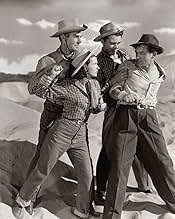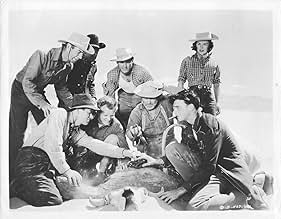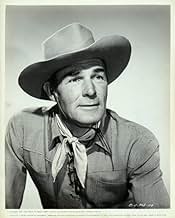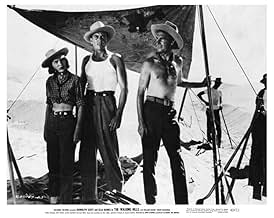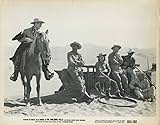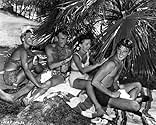IMDb RATING
6.5/10
1.2K
YOUR RATING
A group of treasure hunters search for a wagon load of gold, buried years before in Death Valley.A group of treasure hunters search for a wagon load of gold, buried years before in Death Valley.A group of treasure hunters search for a wagon load of gold, buried years before in Death Valley.
Ralph Dunn
- Detective
- (uncredited)
Ray Jones
- Rodeo Spectator
- (uncredited)
John McKee
- Bronc Handler
- (uncredited)
Frank Merlo
- Bronc Handler
- (uncredited)
Jack Parker
- American Customs Guard
- (uncredited)
Charles Stevens
- Cleve
- (uncredited)
Frank Yaconelli
- Bartender
- (uncredited)
- Director
- Writers
- All cast & crew
- Production, box office & more at IMDbPro
6.51.2K
1
2
3
4
5
6
7
8
9
10
Featured reviews
Terrific little treasure hunt movie
John Sturges, later to direct The Magnificent Seven and Bad Day at Black Rock, does extremely well with this little sleeper about modern day westerners hunting for a lost gold caravan in the California desert. William Bishop isn't bad as the honest murder fugitive, and John Ireland and Arthur Kennedy are strong as usual as a couple of not-very-ethical types. Randolph Scott gets to play some interesting notes here as a horse rancher caught up in the hunt, and the supporting parts are all well played. The sandstorm in the last act is really terrifically exciting, and speaking as one who's filmed during a sandstorm, it's hard to believe the stars put up with filming such a long sequence in those conditions. My hat's off to them and to Sturges for a fine little movie, written by Alan Le May (of The Searchers and The Unforgiven fame).
A Small Delight
We have been seeing this on the TV Westerns channel. It's a very film noir western. Beside the always sturdy and moral Randolph Scott, there were two special delights. Ella Raines is my long favorite among the older actresses, with her bright eyes and rather sarcastic manner always seeming to be laughing at some private joke. I feel a personal connection to her in that she was born a month after my father and followed him by a month in death. She first captured my fascination in "The Suspect" with Charles Laughton and then in "The Strange Affair of Uncle Harry" with George Sanders. Josh White is the really special feature here. How often do you find such wonderfully played Delta Blues inexplicably inserted into the plot of a 1949 western? It's not a truly great movie but still a must-see because it is so ahead of it's time. "Bad Day at Black Rock" meets "O Brother Where Art Thou."
Like shovelling sand into the wind.
The Walking Hills is directed by John Sturges and written by Alan LeMay. It stars Randolph Scott, Ella Raines, Arthur Kennedy, Edgar Buchanan, John Ireland, William Bishop, Josh White and Jerome Courtland. Music is by Arthur Morton and cinematography by Charles Lawton Jr.
Upon hearing a chance statement about lost gold, a disparate group of people head out in search of it to the desert plains of The Walking Hills...
Whipping up a sandstorm.
A sort of contemporary Western film noir fusion, The Walking Hills is a darn fine drama that is acted accordingly. Though blessed with action, tension and passion, it's as a character study where the picture excels. True enough to say it's not overly complex stuff, the greed is bad motif a standard narrative strand, as is the tricky love triangle that resides within the sandy tale, but with the wily Sturges and the shrewd LeMay pulling the strings this plays out always as compelling. With the great Lawton Jr. adding his considerable skills as a photographer - ensuring the Alabama Hills and Death Valley locations are key characters themselves - the production shines.
Often mentioned in reference to The Treasure of the Sierra Madre, it of course is not as good as that superb picture. That it earns its right to be considered a baby brother to it, though, is testament to its worth in itself. 7/10
Upon hearing a chance statement about lost gold, a disparate group of people head out in search of it to the desert plains of The Walking Hills...
Whipping up a sandstorm.
A sort of contemporary Western film noir fusion, The Walking Hills is a darn fine drama that is acted accordingly. Though blessed with action, tension and passion, it's as a character study where the picture excels. True enough to say it's not overly complex stuff, the greed is bad motif a standard narrative strand, as is the tricky love triangle that resides within the sandy tale, but with the wily Sturges and the shrewd LeMay pulling the strings this plays out always as compelling. With the great Lawton Jr. adding his considerable skills as a photographer - ensuring the Alabama Hills and Death Valley locations are key characters themselves - the production shines.
Often mentioned in reference to The Treasure of the Sierra Madre, it of course is not as good as that superb picture. That it earns its right to be considered a baby brother to it, though, is testament to its worth in itself. 7/10
A different type role for Randy Scott
In 1948 the blockbuster movie John Huston's "The Treasure of the Sierra Madre" hit the big screen. This cinematic masterpiece took the entertainment world by storm and spawned several copies and variations including this early John Sturges flick. The same year 1949 saw a much better version on the same theme "Lust for Gold" starring Ida Lupino, Glenn Ford, and Gig Young, though neither reached the lofty peaks of Huston's classic. Coincidentally stalwart character actor Edgar Buchanan was in both films. Though "Lust for Gold" is better, "The Walking Hills" has its own merits. This thirst for hidden treasure is a recurring theme throughout mankind's existence on earth going all the way back to Soloman and before. During the post-World War II period when this film was released there was even a mad rush to find uranium because of the arms race involving the Cold War and the specter of the atomic bomb. Geiger counters became the rage. Hollywood hoped to cash in on this craze.
One facet of "The Walking Hills" that caught my attention was the role played by Randolph Scott(Would you believe Jim Carey?). Apparently a fairly well-to-do horse breeder who talks about the races, his energy and time centers more on his mare who is about to foal than on the gold or the attractive Chris Jackson, played with sexual magnetism by the lady with the hypnotic eyes Ella Raines. He comes across as somewhat selfish and even pushy when he assumes leadership of the group of fortune seekers who did not ask his assistance. Only Frazee (John Ireland), the apparent private dick, attempts to stand up to him to no avail. Naturally, his reason is as selfish as Carey's. Actually, this is one of the most complicated roles Scott ever played and he shines as the brilliant actor that he was.
Of the gold seekers, Arthur Kennedy is virtually wasted in a nondescript part. A face you seldom see on the big screen Jerome Courtland does a fine job in his part which is also somewhat mysterious. Willaim Bishop who tragically made too few films before his untimely death from cancer does well as the fugitive member of the gold seekers (Is he the only fugitive present?). Wily Edgar Buchanan as Old Willy talked the well-worn philosophy that he did so well. It's good to see the pop blues singer Josh White in a rare film appearance. One wonders why he didn't make more movies. His acting is almost as good as his singing and guitar playing. This is one of the few westerns (maybe the only one) that features the blues rather than country and western or Hollywood music. White was never quite the legend that Leadbelly was but some of his music was influential on the later folk revival in America.
The script by Alan LeMay who wrote the novel from which "The Searchers" was adapted, leaves a lot to the viewer's imagination. There is much that is hidden and esoteric. Some of it is revealed by director Sturges in flashbacks but much goes unanswered. This is a ploy used by Hitchcock in many of his films. Hitchcock believed that certain parts of a story should be left to the imagination. Apparently LeMay felt the same way.
There is much talk and conflict among the seekers that eventually leads to death for some of them. Nature intervenes in the form of a sandstorm, the highlight of this movie and not to be missed. Sturges shines as a director throughout with his innovative use of the camera, but the sandstorm is a treat to behold. The storm is also metaphorical. It washes away much and reveals much about human nature and the souls of the seekers. The Death Valley locale is appropriate for both story and character development.
The title "The Walking Hills" refers to the shifting sands that form dunes that seem to walk like humans. The sand dunes may also hide items mankind values and then suddenly make them reappear.
One facet of "The Walking Hills" that caught my attention was the role played by Randolph Scott(Would you believe Jim Carey?). Apparently a fairly well-to-do horse breeder who talks about the races, his energy and time centers more on his mare who is about to foal than on the gold or the attractive Chris Jackson, played with sexual magnetism by the lady with the hypnotic eyes Ella Raines. He comes across as somewhat selfish and even pushy when he assumes leadership of the group of fortune seekers who did not ask his assistance. Only Frazee (John Ireland), the apparent private dick, attempts to stand up to him to no avail. Naturally, his reason is as selfish as Carey's. Actually, this is one of the most complicated roles Scott ever played and he shines as the brilliant actor that he was.
Of the gold seekers, Arthur Kennedy is virtually wasted in a nondescript part. A face you seldom see on the big screen Jerome Courtland does a fine job in his part which is also somewhat mysterious. Willaim Bishop who tragically made too few films before his untimely death from cancer does well as the fugitive member of the gold seekers (Is he the only fugitive present?). Wily Edgar Buchanan as Old Willy talked the well-worn philosophy that he did so well. It's good to see the pop blues singer Josh White in a rare film appearance. One wonders why he didn't make more movies. His acting is almost as good as his singing and guitar playing. This is one of the few westerns (maybe the only one) that features the blues rather than country and western or Hollywood music. White was never quite the legend that Leadbelly was but some of his music was influential on the later folk revival in America.
The script by Alan LeMay who wrote the novel from which "The Searchers" was adapted, leaves a lot to the viewer's imagination. There is much that is hidden and esoteric. Some of it is revealed by director Sturges in flashbacks but much goes unanswered. This is a ploy used by Hitchcock in many of his films. Hitchcock believed that certain parts of a story should be left to the imagination. Apparently LeMay felt the same way.
There is much talk and conflict among the seekers that eventually leads to death for some of them. Nature intervenes in the form of a sandstorm, the highlight of this movie and not to be missed. Sturges shines as a director throughout with his innovative use of the camera, but the sandstorm is a treat to behold. The storm is also metaphorical. It washes away much and reveals much about human nature and the souls of the seekers. The Death Valley locale is appropriate for both story and character development.
The title "The Walking Hills" refers to the shifting sands that form dunes that seem to walk like humans. The sand dunes may also hide items mankind values and then suddenly make them reappear.
Is there gold in those hills?
Since 1945 when Randolph Scott decided to concentrate almost exclusively on westerns only one of his westerns was set in the modern west and that is this one, The Walking Hills. Shot on location the film holds it own with such gold hunting classics as The Treasure Of The Sierra Madre and Lust For Gold.
Sitting around a poker table one night Edgar Buchanan starts recounting a tale in which a wagon train loaded with sacks of gold dust got lost in the desert in the great Southwest. They're quite an assortment of characters in the place, they include at least one private detective in John Ireland and he's after one of the people in the room. But more than one of them has a reason to fear the law.
So all that were in that small barroom set out to the desert fueled by another story that Jerome Courtland tells about coming across an old wagon wheel that would have been contemporary with that gold train. Quite an assortment go besides those in the cast I've already mentioned the guys include William Bishop, Arthur Kennedy, Joe White, Russell Collins and Charles Stevens. Bishop adds an additional plot component, not only is he a suspect, but he's wooing Ella Raines who used to go out with Scott. As for Scott he's concerned with a mare in foal and he brings her along as well. Later on Ella Raines declares herself in on the gold hunt.
Although with a lot more cast members out in the desert some people's true nature starts to surface. Quite a few of the cast meets their doom. As for the gold, just about the same ironical ending as in The Treasure Of The Sierra Madre.
In a book on the Films of Randolph Scott there's a story told about Ella Raines's husband Ransom Olds who was an air ace from the recent war and would be one again in Korea and Vietnam. It seems as though for a joke he buzzed the company on location. He thought it was funny, but the roaring jet passing over frightened all the horses and the wranglers spent the rest of the day rounding them up. Ella was not amused either, nor I'm sure was Harry Cohn.
Not as good as Lust For Gold or The Treasure Of The Sierra Madre, The Walking Hills still holds its own with the others and holds up well for today's audience. Greed is a timeless and universal theme.
Sitting around a poker table one night Edgar Buchanan starts recounting a tale in which a wagon train loaded with sacks of gold dust got lost in the desert in the great Southwest. They're quite an assortment of characters in the place, they include at least one private detective in John Ireland and he's after one of the people in the room. But more than one of them has a reason to fear the law.
So all that were in that small barroom set out to the desert fueled by another story that Jerome Courtland tells about coming across an old wagon wheel that would have been contemporary with that gold train. Quite an assortment go besides those in the cast I've already mentioned the guys include William Bishop, Arthur Kennedy, Joe White, Russell Collins and Charles Stevens. Bishop adds an additional plot component, not only is he a suspect, but he's wooing Ella Raines who used to go out with Scott. As for Scott he's concerned with a mare in foal and he brings her along as well. Later on Ella Raines declares herself in on the gold hunt.
Although with a lot more cast members out in the desert some people's true nature starts to surface. Quite a few of the cast meets their doom. As for the gold, just about the same ironical ending as in The Treasure Of The Sierra Madre.
In a book on the Films of Randolph Scott there's a story told about Ella Raines's husband Ransom Olds who was an air ace from the recent war and would be one again in Korea and Vietnam. It seems as though for a joke he buzzed the company on location. He thought it was funny, but the roaring jet passing over frightened all the horses and the wranglers spent the rest of the day rounding them up. Ella was not amused either, nor I'm sure was Harry Cohn.
Not as good as Lust For Gold or The Treasure Of The Sierra Madre, The Walking Hills still holds its own with the others and holds up well for today's audience. Greed is a timeless and universal theme.
Did you know
- TriviaOne of 7 Randolph Scott films that Edgar Buchanan (Old Willy) appeared in.
- GoofsSince the action appears to be in the late 1940s. Instead of digging all over the dunes, why didn't they get a WW2 surplus mine detector?
- Quotes
Chris Jackson: [Referring to the large bandage on her forehead] Yeah, until I went bangin' my puss! Now get lost, will ya?
- SoundtracksYou Won't Let Me Go
Sung by Josh White
- How long is The Walking Hills?Powered by Alexa
Details
- Runtime
- 1h 18m(78 min)
- Aspect ratio
- 1.37 : 1
Contribute to this page
Suggest an edit or add missing content

